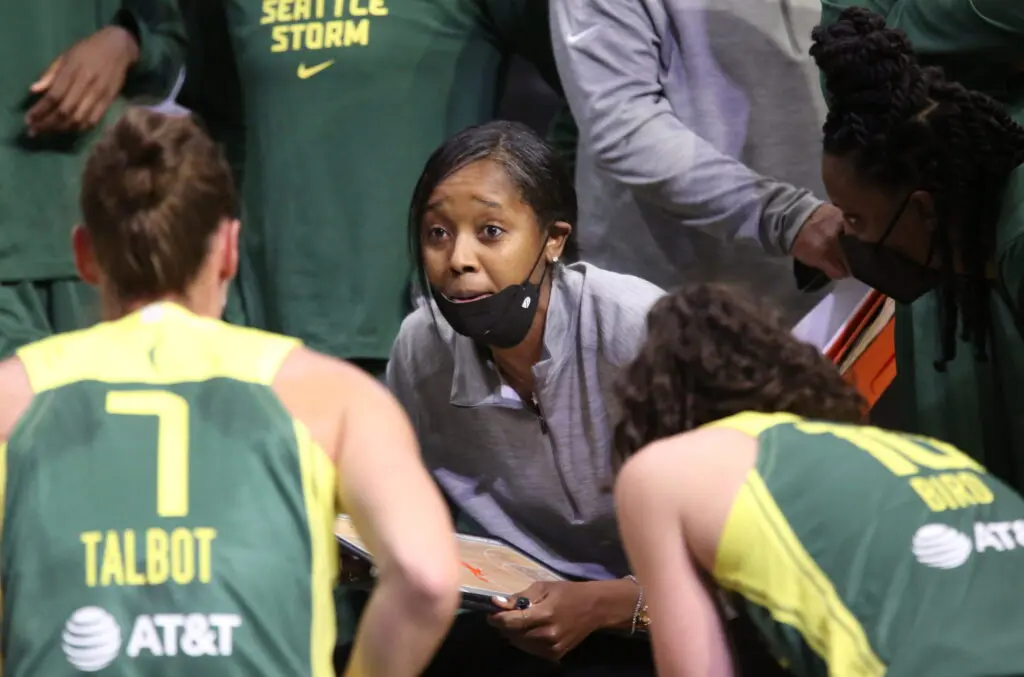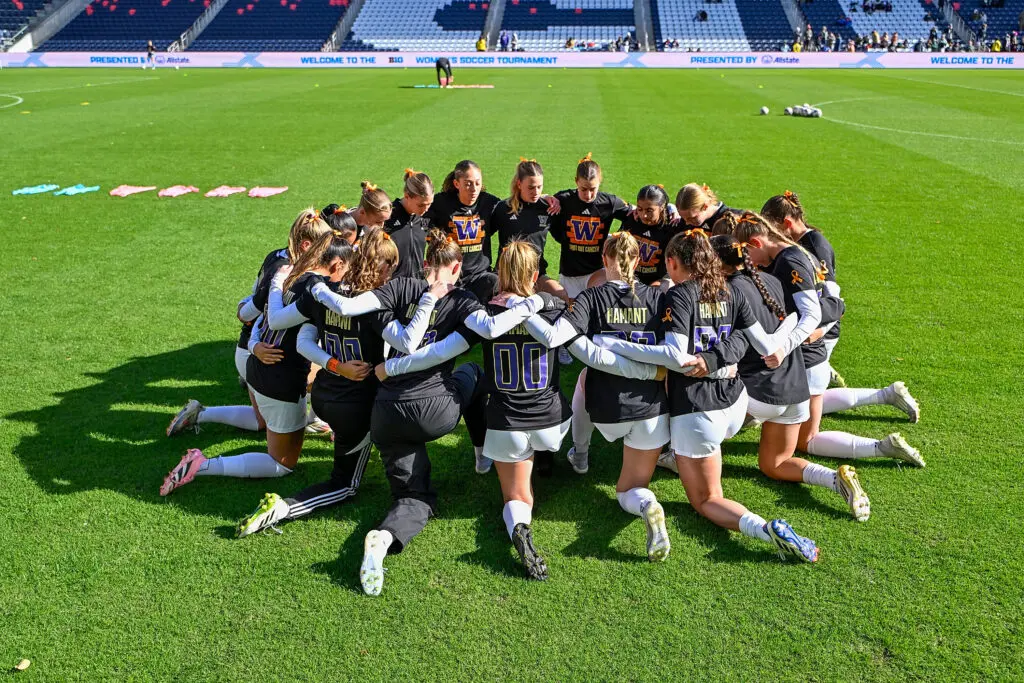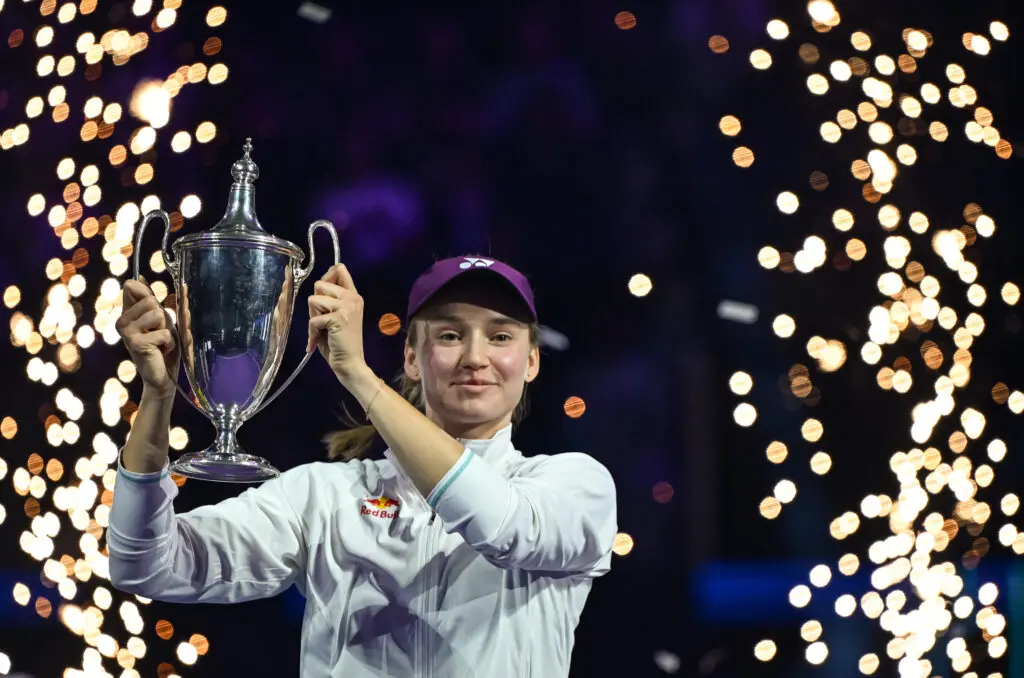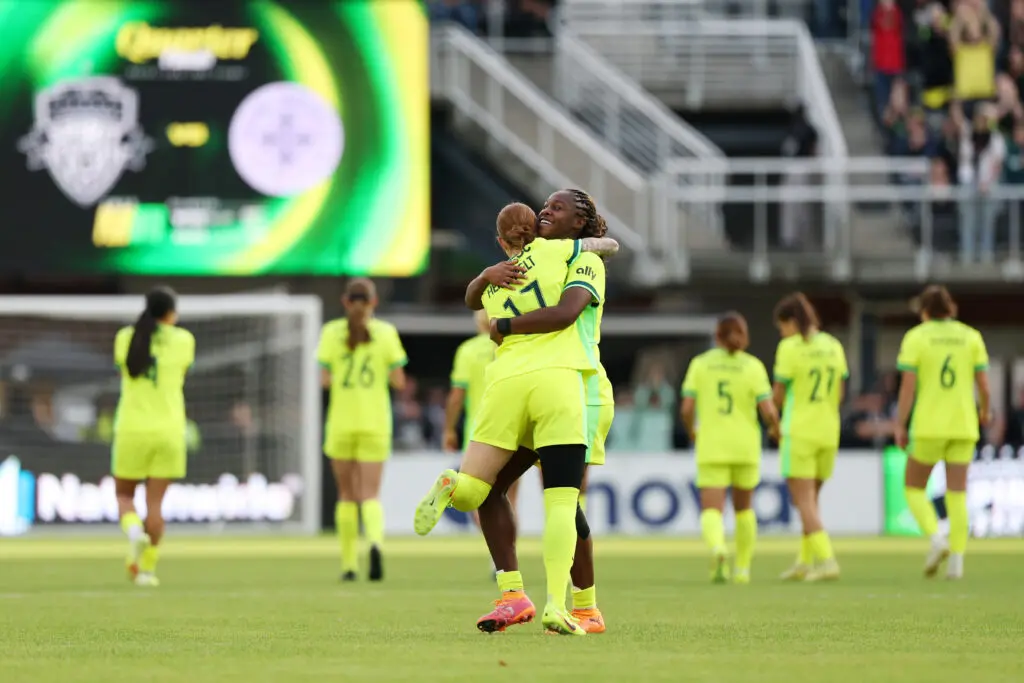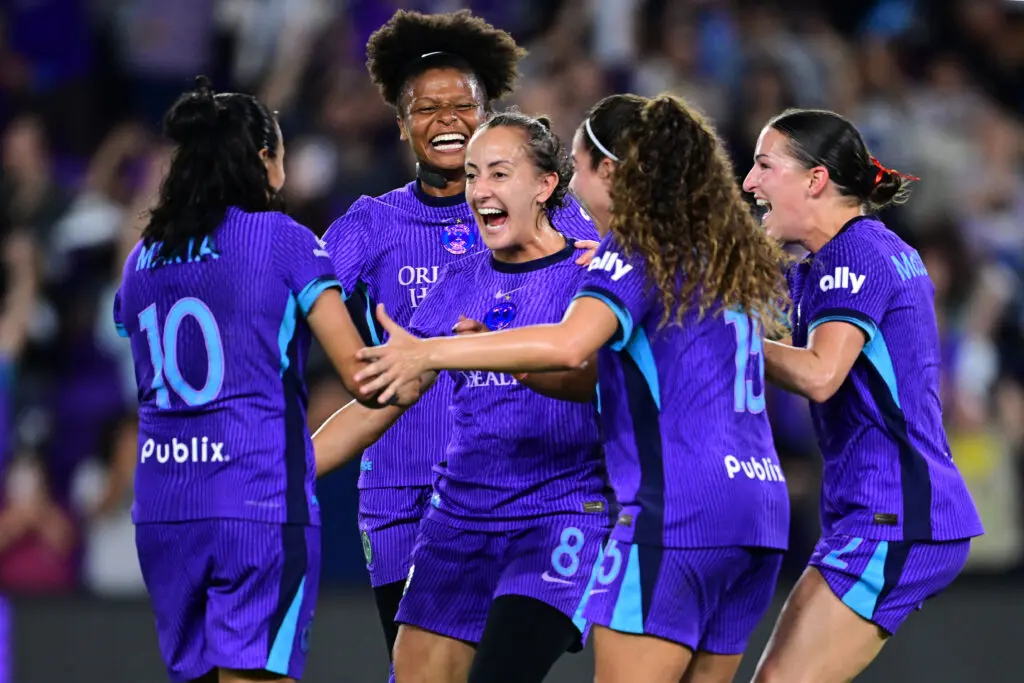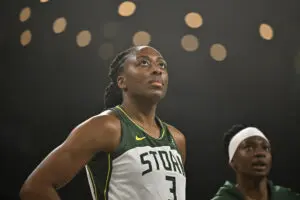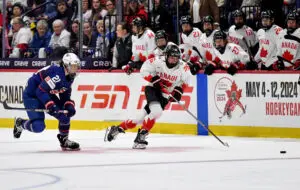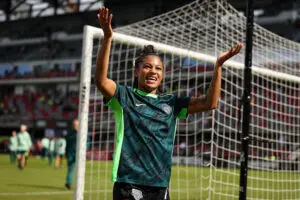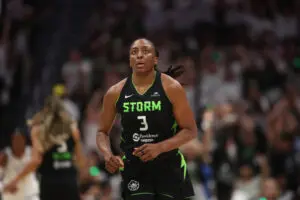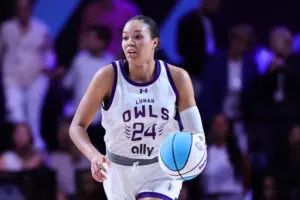Noelle Quinn spent Memorial Day Weekend in a WNBA whirlwind. In the span of 72 hours, she went from being an associate head coach of the Seattle Storm to giving an introductory press conference as their new head coach. The very next day, she guided the Storm to an 88-73 win over the Indiana Fever.
“I think the emotions of everything, I was kind of floating in that it was very surreal,” Quinn says. “But understanding we have a game to play and I was just trying to stay focused on that, it was a lot.”
Quinn and the Storm coaching staff knew Dan Hughes was eventually going to retire. Seattle was already a couple of weeks into the season, but Hughes ultimately felt it was the right time after 20-plus years of coaching in the WNBA and three with the Storm. As his successor, Quinn became the first Black female head coach in the history of the franchise.
“(I have) incredible respect for Dan and what he’s meant to the league and the organization. Learned a lot from him and will continue to learn from him,” Quinn says. “So I thank God, knowing that I’m the first at something but also that I can pave the way for someone coming up to also have an opportunity and can continue on the legacy, continue on the assistant coaching tree, so to speak.”
Quinn has made the transition look seamless. Since taking over as head coach, she’s led the Storm to a 7-3 record, including a six-game win streak, that’s allowed them to maintain their hold on first place. Seattle leads the WNBA in total assists (365), assists per game (22.8) and effective field goal percentage (52.7). For a team that thrives on chemistry on and off the court, the Storm have gelled faster and better than even they expected this season with a handful of new players on the roster.
Quinn, a former WNBA player and champion with the Storm, has a knack for connecting with her players and creating a team bond. At 36 years old, she’s also relatable. One of the first messages Quinn delivered to her team after assuming the role of head coach was that they needed to get back to having fun.
“Basketball is what we do, it’s not who we are,” Quinn said during her introduction on May 31. “Our joy comes from within, honestly, and nobody can take that away from us. I think we are at our best when we’re having fun.”
Where Quinn comes from, it’s just one lesson from a deep, layered basketball education.
***
Quinn never set out to be a basketball coach. Her goal was to “keep playing and hooping” as long as possible. But over the course of her long playing career, something shifted.
“I used to have a notebook — I still have a notebook — of plays that I would like over the course of years of playing, that coaches would cook up, and maybe innately I was building my mind to become a coach,” she says. “(I) just kind of always was a student of the game. I always watched a lot of basketball, no matter what the level.”
That journey started at Bishop Montgomery High School in Torrance, Calif., where the marquee hasn’t changed since Quinn took the job in Seattle. “Congratulations Noelle Quinn ‘03,” it reads. “Head Coach WNBA Seattle Storm.”

Quinn first arrived at Bishop Montgomery in 1998 as an eighth grader and, over the course of four years, led the Lady Knights to four state championships. Steve Miller, the assistant principal, still remembers meeting Quinn when she toured the school with her mother. Even after Quinn moved on to a standout career at UCLA and a 12-year stint in the WNBA, Miller stayed close with her.
“I called her that Sunday right away when I heard she was named the head coach, and I can’t be prouder of her. She deserves it, without a doubt,” he says. “It doesn’t surprise me that it was quietly done, but that’s just how (Noelle) rolls.”
In 2016, when Quinn was still playing in the WNBA, she returned to Bishop Montgomery to take over as head coach of the women’s basketball team — her first head coaching position. The Lady Knights won the California Interscholastic Federation Southern Section (CIF) championship in her first season.
Quinn’s coaching goal on a day-to-day basis was about more than basketball. She focused on inspiring the young women and making sure they knew she cared about them as much individually as she did collectively.
“A lot of those kids may not go on to play Division I or play basketball for the rest of their lives, so if all they have is four years of the high school setting, it becomes (important) for me to be a light for them, inspire them, show them the way, care about them,” says Quinn. “That’s what I really enjoyed.”
“She changed so many lives the moment she walked back on campus,” Miller says. “Wherever she goes, she does that. I know that the girls know how special it is that they were able to have that opportunity to be coached by her. … She got 100 percent out of each one of those players. It doesn’t matter if they were the star of the team or the fifteenth person, she made them all very special.”
***
Even if Quinn didn’t see her own coaching potential, her coaches, teammates, friends and mentors did.
At UCLA, where Quinn averaged 17.1 points, 4.2 assists and 7.4 rebounds per game, she was known for making those around her better. After graduating in 2007, Quinn was drafted fourth overall by the Minnesota Lynx. As a rookie, she set a franchise record for most assists (14) in the final game of the season, and her season assist total (148) tied a franchise record held by WNBA great Teresa Edwards.
Quinn played for five teams over 12 years — the Lynx, Sparks, Mystics, Mercury and Storm — and was respected for her leadership, reliability and versatility. During that time, she also played for a lot of great coaches, including Sandy Brondello, Brian Agler and Jenny Boucek. Quinn would study their approach and their preparation, watch how they managed their players, take note of their demeanor and keep a mental list of what she liked and didn’t like.
“She’s just always been steady. She never gets too high, she never gets too low,” says UCLA alum and women’s basketball legend Ann Meyers Drysdale. “To me, she’s just always observing and seeing what’s next. She played for five teams, and I think she was solid everywhere she went and constantly learning.”

Sometimes players wonder why coaches do the things they do, say the things they say. Quinn not only understands the dynamic, she also coaches from that very angle. She explains where she’s coming from when she draws up plays, makes substitutions and talks to her team during a timeout. She knows players appreciate the context because she’s been in their position.
“As a player, I was doing a lot of the same things in the locker rooms. In timeouts, I was helping everyone, and so that kind of made it a seamless transition because I’m essentially doing the same thing I was doing later on in my career,” Quinn says. “Just to have that camaraderie from playing pour over into our relationship as player and coach, we can talk through things, we can learn from each other still.”
It helps that Quinn played with four players she’s now coaching in Sue Bird, Breanna Stewart, Jewell Loyd and Jordin Canada. They won a championship together as players in 2018 and again when Quinn was an assistant coach in 2020.
During their last season playing together in 2018, Bird says there were multiple times when she’d be about to walk onto the court after a timeout and Quinn would say, “Hey, you might want to run this play because this team is doing this.” From those glimpses into Quinn’s feel for the game, Bird knew Quinn was ready to be a head coach.
“I think it’s a step that’s been needed, and a step that will probably open more doors for more women, for more former players, for people of color,” Bird said, adding, “The things that (Noelle) has, the things that a lot of former players have, you just can’t teach.”
***
When the WNBA first began in 1997, there were eight teams and seven female coaches. Today there are four, a group that now includes Quinn.
Opportunity is something Quinn has spoken about a lot. It’s important, she says, for WNBA front offices to understand that players are capable of leading a team. But unless former players are given opportunities, the lack of female coaches in the league (or in the NBA) won’t change.
“I’ve said this for years, broadcasting, that why shouldn’t the players take over just like they have in the NBA?” Drysdale says. “The majority of coaches, not all of them, but the majority of coaches in the NBA have been players. There’s no reason five years into the WNBA that that wasn’t happening. … I’m not saying anything against coaches that are in the league now. They’re all terrific. But at some point, I’d like to get the majority again being women coaches.”
Quinn thinks it’s already shifting in that direction.
“As you look around the league there are a lot of former players that are on staffs right now. To have the ability to stay within the game, I think a lot of players would want to do that,” she says. “Especially making that transition from playing basketball all our lives to deciding what we want to do, it’s just an avenue that a lot of players would love. But to have an opportunity is the biggest thing.”
When Quinn spoke about becoming the first Black female head coach in Storm history in her introductory press conference, she didn’t hold back emotion. She reeled off a list of all the Black women who came before her as WNBA head coaches and helped pave the way:
Pokey Chatman; Teresa Edwards; Jennifer Gillom; Carolyn Jenkins; Vickie Johnson; Trudi Lacey; Cynthia Cooper; Cheryl Miller; Carolyn Peck; Julie Rousseau; Amber Stocks; Karleen Thompson; Shell Dailey; Jessie Kenlaw; Cathy Parson; Taj McWilliams-Franklin; Denise Taylor; Penny Toler.
At her introductory press conference, Noelle Quinn talked about what it means to be the Storm’s first Black head coach and the 19th Black female head coach in WNBA history. pic.twitter.com/3HTiOVcLDT
— Percy Allen (@percyallen) June 1, 2021
“What’s interesting is only one person on that list is still in our league, and that’s Vickie Johnson,” Quinn says. “Now I have younger generations understanding that it is possible, that this job is for young girls who look like me. I think the opportunity for younger generations to understand that we’re more than just athletes, I understand the weight of that.”
Now that Quinn has the opportunity in her hands, she’s intent on making the most of it. The Storm have high expectations. They have the talent and experience to make it back to the WNBA Finals and repeat as champions. And Quinn has embraced that challenge head on.
She knows what it takes, after all.
“It’s twofold,” she says. “It does feel like it puts pressure (on you) to be successful, but at the end of the day, when you are given the opportunity, you want to be able to show that you can do it.
“And those opportunities should come more frequently, more often.”
